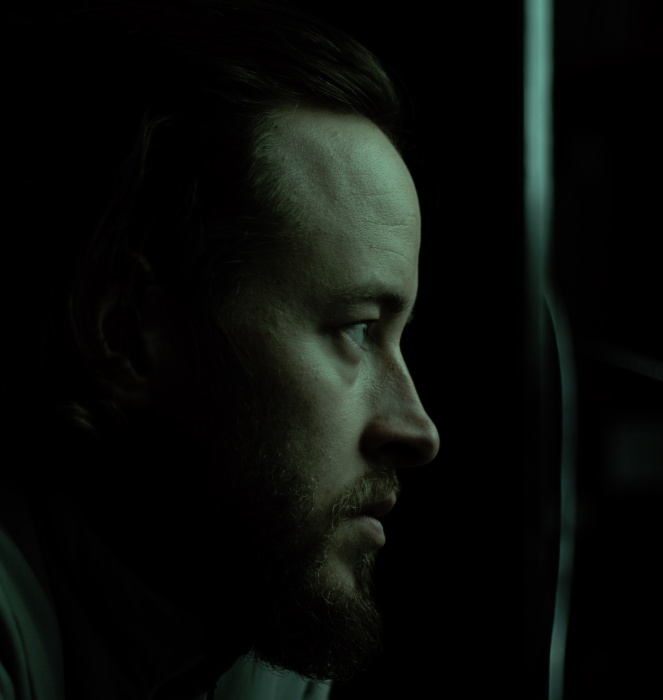 He cradled his head in his rough, battle-scarred hands, breathing heavily. The accelerated pace of his heart drummed so loudly he could hear nothing else. Sweat beaded on his forehead as blood pounded in his temples. He inhaled deeply, attempting to calm himself. He was thankful to have found this temporary refuge, even if it was a grimy old bathroom. The grinding of the pneumatic impact wrench securing nuts on wheels sounded eerily similar to the battle zone. Before he could acknowledge the trigger, he’d felt his body go into a tailspin. With herculean effort, he stood very slowly, making a deliberate B-line for this small sanctuary.
He cradled his head in his rough, battle-scarred hands, breathing heavily. The accelerated pace of his heart drummed so loudly he could hear nothing else. Sweat beaded on his forehead as blood pounded in his temples. He inhaled deeply, attempting to calm himself. He was thankful to have found this temporary refuge, even if it was a grimy old bathroom. The grinding of the pneumatic impact wrench securing nuts on wheels sounded eerily similar to the battle zone. Before he could acknowledge the trigger, he’d felt his body go into a tailspin. With herculean effort, he stood very slowly, making a deliberate B-line for this small sanctuary.
This was all so humiliating.
Stupid, stupid STUPID! Why did he have to be weak like this?!?
None of the guys from the hundred and first had this problem! They were still smoking and joking about the war like it was some video game. Only the weak ones contracted this illness.
His hair brushed back and forth over his hands as he shook his head, acknowledging the lie as it snaked its way through his thoughts. Hadn’t he just been to Jameson’s funeral? It was the second service for which he’d pulled on the uniform; the second service he’d attended not due to death in battle, but because of it. Jameson, the bulky master sergeant who could laugh more easily in the face of impending doom than the rest of them. Jameson, who’d taken 3 bullets and while simultaneously dropping 20 insurgents. He could still see him, drenched in red, determined to carry himself to the humvee on his own two feet.
Jameson was strong, but he’d suffered from this stupid problem too. It cost him his life.
When word came about Jameson, he thought it was the result of some overlooked infection from war wounds. It wouldn’t be the first time the VA missed something important. He wasn’t prepared to learn that Jameson died from a self-inflicted hole in the head. The pale, crumpled face of Jameson’s wife Kerry floated before his eyelids now. Jameson wasn’t weak, and yet he too suffered from this same debilitating disease that everyone attributed to weakness.
P-T-S-D. A real four-letter word if there ever was one.
High blood pressure. Black-outs. Night sweats. Nightmares. Flashbacks. Irritability.
Would it ever end?
He couldn’t go get help. To do so would be to admit “weakness.” He was a vet—tough and unshakeable. He’d seen and done things that’d make most men wet themselves, especially those irritating talking heads with their sissy makeup and their purchased Ivy League degrees. He clenched and unclenched his fists as he thought of their arrogant faces.
“We support the troops but not the war.”
He snorted. They think they know so much…
“Stop thinking about it,” he told himself.
He gritted his teeth, concentrating on each inhale and exhale. He started subtracting 7 from 100 and moving backwards, just like his VA psycho psychologist had recommended. When he reached 16, he went back to just focusing on the breath going in and out.
He prayed for help with each exhale, squeezing his hands tightly in front of him, trying to ignore that heavy metal escape hatch pressing eagerly into his hip. He didn’t want to go like Jameson, but he was so weary.
“Lord, I’m so frustrated. I’m so tired. Help me, please…” he whispered fervently.
“Please…”
Post-Traumatic Stress Disorder.
PTSD.
I’ve watched the destruction of this devastating illness firsthand.
Much like the wind, you cannot see the illness, but its influence is measurable—irritability, high blood pressure, lack of concentration. The impact of emotional trauma to the brain is akin to the physical damage caused by a car wreck. Recovery from PTSD, however, is far more daunting than the car wreck. For one thing, if your body is mangled in an auto accident, the wounds are immediately visible. Doctors see what needs treatment and take swift action. The glaring injuries and subsequent recovery are apparent to anyone with two eyes.
The carnage of PTSD is intangible; it’s effects are often unrecognized and untreated.
It may seem odd during this festive time of year to raise such a heavy topic, but in all the hype of Christmas there are real people suffering from real grief, depression, sundowner’s, PTSD, and more. To these individuals, Christmas is an intense source of stress. They deserve our compassion, our most fervent prayers, our time, and our love.
In the coming weeks, we are going to look at a few “invisible illnesses” like PTSD, depression, sensory processing disorder, ADHD, and autism. I may be in a bit over my head, but I know the need is real. We have Christians and non-Christians alike suffering from these illnesses and the most common response is to belittle them in ignorance. The goal is to educate ourselves in facts and discuss ways in which we can extend compassion. If you are struggling with one of these illnesses, it is my goal to let you know you are not alone and encourage you to get the support you need to heal. Take heart; you are loved with an everlasting love by One who knows what you are dealing with more intimately than anyone.

Amen. This was well written.
One thing I really wish we’d do is treat people as if they had 3 parts, mind, body, and spirit. Things like ptsd are physical, they are chemical, but they also have a psychological and spiritual aspect to them and healing needs to address all the parts of a person.
LikeLiked by 2 people
Well-said, IB! You said in a few short words the gist of what I wish to express. We are so fearfully and wonderfully made. In spite of all the knowledge we’ve accumulated, we still tend to be one-dimensional in our approaches. Thank you so much for your insight!
LikeLiked by 1 person
Reblogged this on Talmidimblogging.
LikeLiked by 1 person
Thank you Vincent! God be with you!
LikeLiked by 1 person
You’re very welcome Elihu and God be with you too 😎
LikeLiked by 1 person
Reblogged this on thotsfromgeorge.
LikeLiked by 1 person
Thank you for sharing! God be with you!
LikeLiked by 1 person
Elihu, thank you for this post. It is so important to keep our veterans in thoughts and prayers. They each have given so much for us, we need to show appreciation and thankfulness to them. If we know any, we need to see how we can help. And we need to pray, as Jesus Christ is able to work in each life.
As well as reblogging, I posted your blog to FB. Everyone should read what you have written.
Thanks again. God Bless you.
LikeLiked by 1 person
Thank you, George. 🙂
Yes, I wish more people understood PTSD. My father, a Vietnam Veteran, still suffers from PTSD though most wouldn’t recognize it; I certainly didn’t growing up nor did I really have a real inkling of his struggle until we were struck by PTSD in our own family. He always seemed to have it together to me. He would likely tell you it is God who strengthens Him and comforts Him through it all.
PTSD is such a challenge for those who live with it and I pray that my words offer hope and encouragement to any who read this.
I am thankful Christ is able to work through those who deal with this, and we need to do what we can to be his arms of comfort and his ears of support here on earth. I have seen God do amazing things, and I hope we can lift up those who hurt.
God be with you!
LikeLiked by 1 person
Your post goes hand in hand with the research I’m doing on homelessness. Many of our Veterans! PTSD plays a role in some of the reasons our Vets end up on the streets. Thanks for addressing this issue. As Christians, we have a responsibility to help the “least of these.”
I look forward to your future posts on the other issues you stated as well.
Blessings!
LikeLiked by 2 people
Indeed, Beckie! PTSD makes it difficult for vets to hold down jobs, not due to weakness, but for other reasons (some of which we’ll discuss in the next post). Often PTSD leads to depression so they get hit with a double whammy. Most Americans fail to recognize how deep the sacrifice of our military personnel actually goes, thinking only think of those who lost life or limb; we fail to be compassionate to those who came back without “visible” scarring. This happens to our law enforcement as well; they are extremely neglected in terms of support for their PTSD.
I am enjoying your posts on the homeless and those in need. May the Lord continue to bless your work for Him!
LikeLiked by 1 person
I wholeheartedly agree with you, Elihu. Thanks for using your platform to bring awareness to this issue and hopefully inspire compassion that leads to action.
LikeLiked by 1 person
Amen. Great story to point out the truths of the costs of war.
LikeLiked by 2 people
Thank you, Robert. I hope you are doing well!
LikeLiked by 1 person
Very timely as we just lost one of our old neighbors who took his life. It breaks my heart to think that someone so close by to me was in so much pain.
LikeLiked by 1 person
I am so sorry for your loss! Suicide is devastating. I will pray for his family; the grief is incalculable.
Thank you so much for your comment. We miss you guys!
LikeLike
Wow what an opening short story as an introduction to this series on invisible enemies. What a description of PTSD.
LikeLiked by 1 person
Thanks, SlimJim! I hope you are doing well.
LikeLiked by 1 person
Thanks brother, I am doing well. The Lord bless this series!
LikeLiked by 1 person